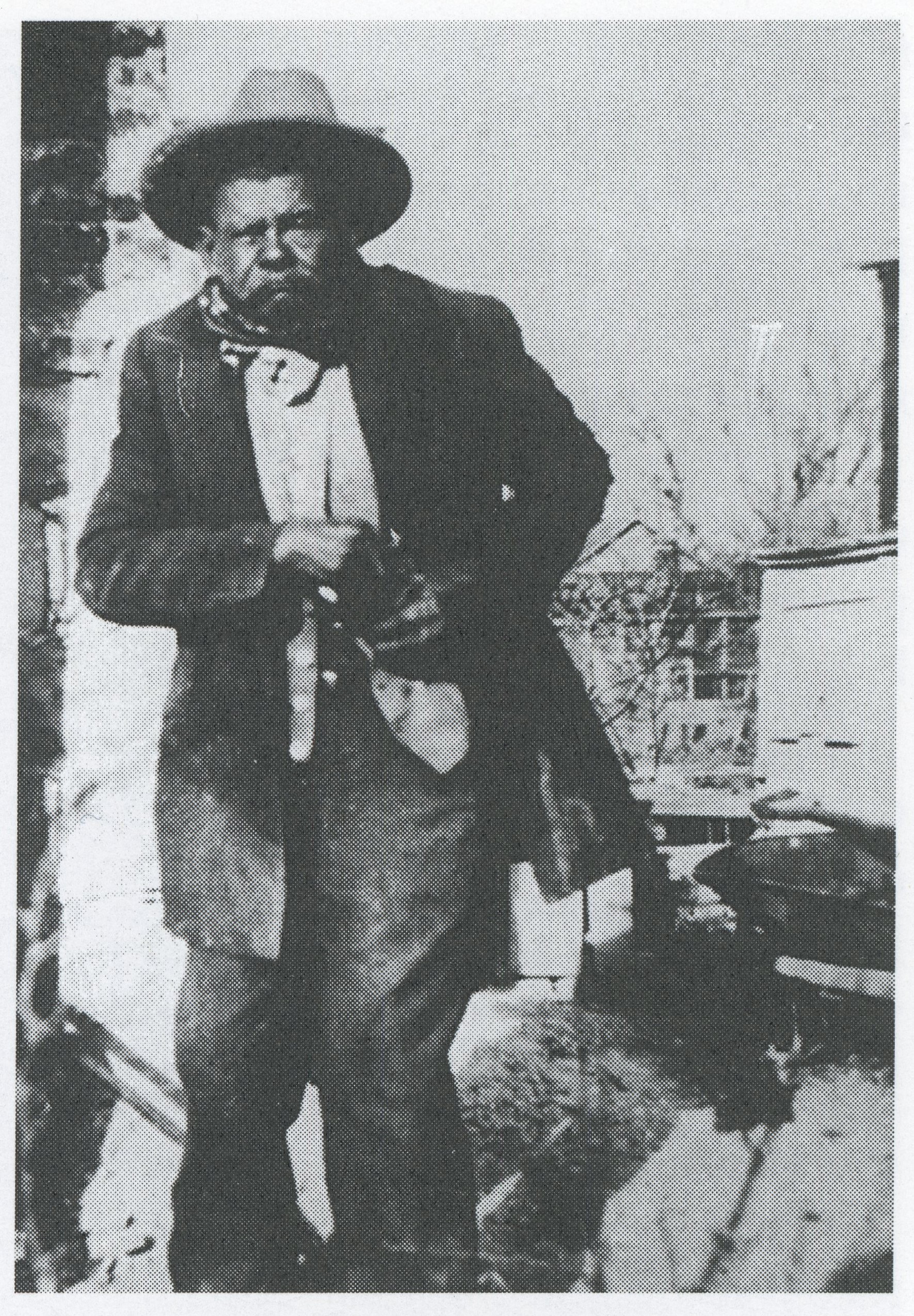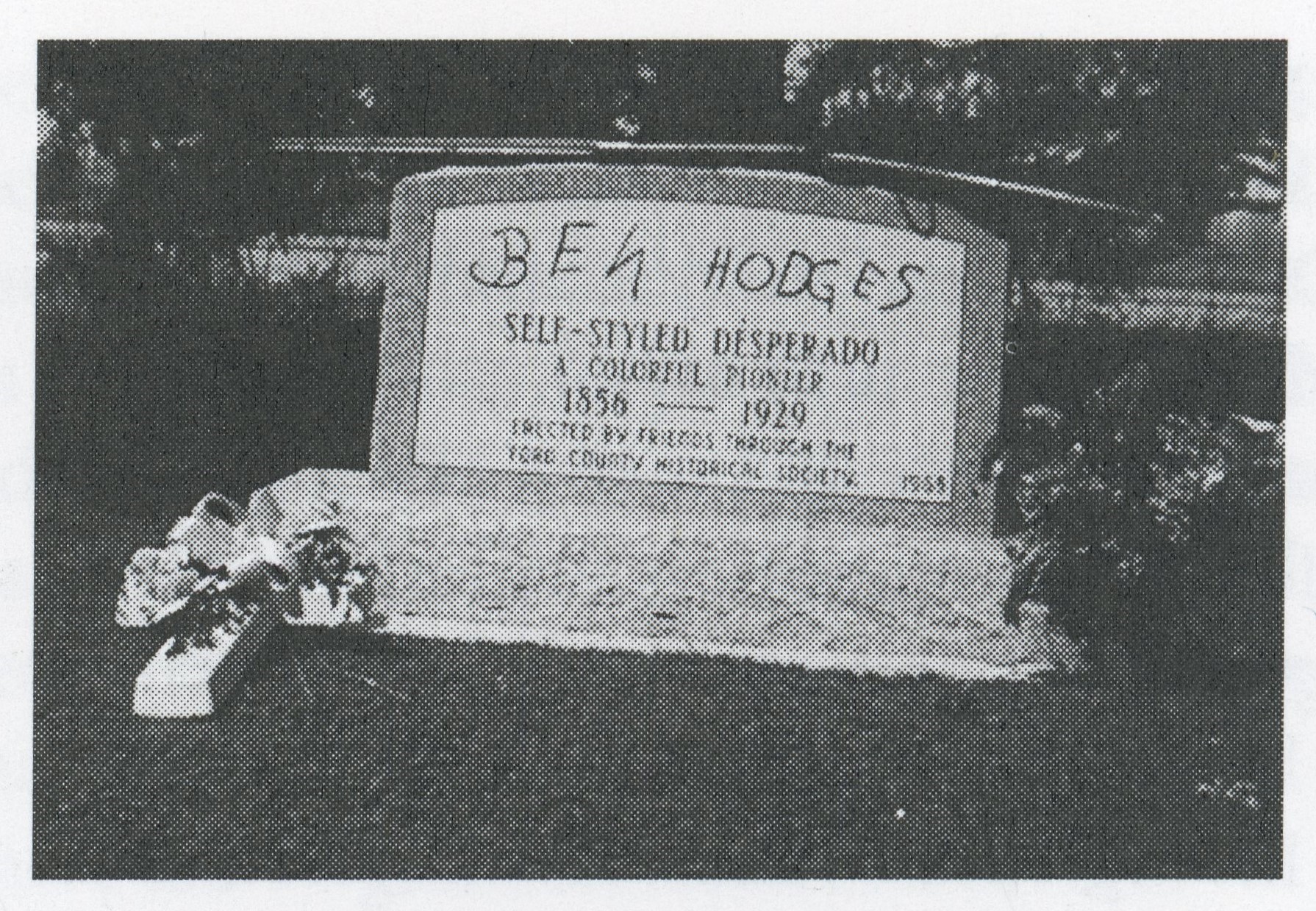SELF-STYLED DESPERADO
[Excerpt from Dodge City and Ford County, Kansas 1870-1920 Pioneer Histories and Stories. Copyright Ford County Historical Society, Inc. All Rights reserved.]
The more articles a person reads about one unforgettable character, the more confused that reader may become. One very colorful fellow who came up the Texas cattle trails to Dodge City in the days when the long horns were driven to the Kansas railheads was Benjamin F. Hodges. The local historian, Heinie Schmidt, remarked that “Ben occupied a pedestal by himself. There was not a single other character in his class.”
One of the most undisputed facts is that Ben Hodges came to Kansas in the spring of 1872, with a herd of Texas cattle driven by W. D. (Doc) Barton of Ingalls, Kansas. Barton described Hodges as “…a worthless, shiftless, no-good.” He came as a cook’s helper on the trail.

Although there are several tales describing Ben’s ancestry, the one that seems the most plausible is that he was part-Mexican and part-Negro. The story is that a high-class Castilian girl was swept off her feet by a handsome young Negro. In spite of her parents’ strong disapproval, she did marry him and little Benjamin was their son. The young lady was eventually persuaded to leave her husband. Young Ben was mistreated by his high-class relatives who felt that he was a disgrace to their fine family. With this background it is not surprising that he ran away at an early age.
Where but in Dodge City could a half-breed, who was known to be a liar and a thief, manage to live his entire life, supported by the people of the community and finally buried by them and even later be supplied a tombstone by their descendants. People who knew him, knew better than to believe the wild tales that he told but he was often known to make his claims to land or cattle so convincing that he was able to obtain letters of credit and bankers’ endorsements in order to obtain money from strangers or newcomers. But he could never establish his claims or repay any of the loans.
Ben loved to brag about having descended from one of the finest Castilian families of Mexico. When rumors were heard that thousands of acres of range land in New Mexico were part of an old Spanish land grant and that the grant was still valid, several of the local cattlemen facetiously suggested to Ben that the land might have belonged to his family. They did it as a joke but it was enough to set Ben’s imagination on fire.
Ben made a trip to Texas and returned with a number of documents showing him to be a legitimate claimant of the grant as well as the representative of other claimants living in San Antonio. Armed with these documents he found a local lawyer willing to take the case and draw up papers for the claim. His seeming sincerity and apparent honesty brought out men who were willing to “buy in” to his claim. He also won the support of undeceived old-timers who enjoyed watching the hoax develop. Of course, his claims could not be proven but Ben enjoyed the prestige of being an heir apparent as long as it lasted. In the years that followed he continued to brag about the vast acreage that those “wicked” people had taken from him.
Although in later years Ben did learn to print his name, it is a shame that a man with as extraordinary imagination such as he had did not learn to read and write. He could have written stories that would have made Ned Buntline and other eastern writers of wild west stories tame by comparison. In his mind his ability to lie and steal and to get by with it, was something to be proud of. He loved to tell tall tales about how bad he was or had been. The fact was, however, that his lies were to build up his ego and his stealing amounted only to petty thievery. He was known to have hidden a few cattle and horses away until a reward was offered and then suddenly “find” them and claim the reward. One time, however, a dairyman’s whole herd was stolen and Ben was brought to court. He had no money, no lawyer, and a bad reputation.
Ben pleaded his own case. After all of the evidence had been presented, he arose to address the jury. He talked for two hours, sometimes making them laugh, sometimes becoming serious and indignant. “What! Me?!” he cried, “the descendant of old Grandees of Spain, the owner of a land grant in New Mexico embracing millions of acres, the owner of gold mines, and villages and towns situated on that grant of which I am sole owner, to steal a miserable, miserly lot of old cows? Why the idea is absurd. No, gentlemen. I think too much of the race of men from which I sprang, to disgrace their memory.”
He was persuasive, bewildering and entertaining. When he finished his pleading, he had won the case. The jury brought in a verdict of, “Not guilty.”
A few days later the missing cattle came home. Ben had stolen them and driven them about 50 miles away but he had left them unguarded and they wandered back home. Fortunately for Ben they returned after he had been acquitted.
Because of Ben’s good nature and ready smile and his refusal to hold a grudge against anyone, no matter how much they teased or threatened him, the townspeople accepted him even to supplying his every need as he grew older and more helpless. He lived for years in a little shack on the south side of town, near the river. As long as he was able he raised a garden and fished on the bank of the Arkansas River, which in those days actually had water in it, where fish could be caught. Few boys grew up in Dodge City who had not sat on that bank and listened by the hour to Ben’s fascinating tales.
The police made him an “Assistant Deputy” and allowed him to carry a gun, minus the firing pin, to protect himself from his imaginary enemies. For years he made his rounds of the stores in Dodge City every day. He always carried a basket on his arm. In the bottom of the basket under a black cloth lay his faithful firearm. As he shuffled from one store to another he collected his food for the day. The butcher at the Stubbs grocery store and the baker at Farley’s bakery always saved back something “for Ben,” as did the clerks in several other stores. Sometimes he just helped himself to this or that, but the store keepers never seemed to see him. “After all,” they would say, “he only took what he needed.”
Thus it was that this self-styled desperado was fed and clothed by the people who knew him. Stories told about this one and only and most unusual pioneer would fill a book. Many of these stories are on file in the Home of Stone in the records of the Ford County Historical Society.
We will never know whether his shuffling footsteps were caused by law men who caught him stealing horses or by rickets that had crippled him in childhood. Most people believe that the former story is true and that instead of hanging Ben they had cut the tendons above his heels as punishment.
One thing that the townspeople knew was that Ben was a faithful Catholic, who had shuffled up the long hill year after year to be greeted by the kindly Father Handley when he arrived to attend Mass. When the old fellow died, at or near 100 years of age on March 10, 1929, his friends who had accepted him as he was could not bear to see him buried in a pauper’s grave. They collected money to buy him a respectable coffin and had him buried in the Catholic cemetery among his friends who had gone before him. Two hundred or more of those who had befriended him gathered at the Sacred Heart church to honor him in death as they had accepted him in life.

There was no money for a tombstone at that time but on May 5, 1965, the descendants of those friends dedicated a fine new stone to Ben Hodges, Self-Styled Desperado. The stone had been bought with money collected from those who knew him and had listened as children to his fabulous stories.
Information was taken from clippings and articles in the files of the Ford County Historical Society at the Home of Stone.
Lola Adams Crum
